KNOXVILLE, Tenn. — The Taliban have seized power in Afghanistan two weeks before the U.S. was set to complete its troop withdrawal after a costly two-decade war.
The insurgents stormed across the country, capturing all major cities in a matter of days, as Afghan security forces trained and equipped by the U.S. and its allies melted away. And as the Taliban retook control of Afghanistan, thousands rushed to leave the country.
A Global Studies Fellow and assistant professor at the University of Tennessee, Gary Uzonyi, gave some context about the situation in the country. The questions he answered are below:
What is the Taliban?
So the Taliban is a rebel movement that formed in the early 1990s. In opposition to the government that took control of Afghanistan following the withdrawal of the Soviet Union. They promised to stabilize the country and to rule under a stricter Islamic law.
By 1996, the Taliban had taken control of the government and remained in power until the U.S. invasion in 2001. Since then, the Taliban has been engaged in insurgency trying to regain control of Afghanistan.
What is the history of the United States' presence in Afghanistan?
So in 2001, the United States invaded Afghanistan as the Taliban had offered harbor for Al Qaeda and Osama Bin Ladin.
In 2001, the U.S. was able to topple the Taliban, who then went into an insurgency-type mode. Again, this is a small rebellion ramping up trying to retake the country. And the U.S. worked to stabilize a democratic government in Afghanistan over the next several years.
But by 2003, attention had largely shifted to Iraq, despite the U.S.'s promises to continue to focus on Afghanistan, seeing Afghanistan as a strategic partner in the Global War on Terror.
And since that time, what we've seen is the different administrations who have been in power here in the United States take different approaches to dealing with the ongoing insurgency of the Taliban, which really ramped up around 2006.
What does the Taliban takeover mean for Afghanistan now, and why are so many people trying to get away from them?
Yes, so when the Taliban was in control of Afghanistan, beginning in 1996, they ruled under strict Islamic law.
So they were heavily repressive, especially to women and girls. They harbored terrorists, and they weren't ever fully able to stabilize the country. So, a lot of the people in Afghanistan today remember what that regime was like in the early 90s.
Now, the Taliban is saying they're not going to be as repressive. They're going to respect human rights. They're going to allow women to work and to get an education and that they will not harbor terrorists moving forward.
There is a lot of concern as to whether these are just words that the international community wants to hear or whether these will be the actions that the Taliban will take moving forward.

